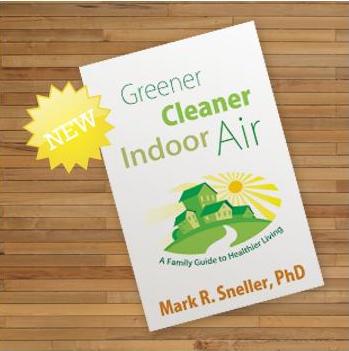I recently had the chance to interview Dr. Mark Sneller, an expert on the topic of indoor air quality (IAQ) and author of the new book Greener, Cleaner Indoor Air: A Guide to Healthier Living (Wheatmark, 2010). He gave me such in-depth answers on this critical topic that I decided I’d publish them in three parts. Here’s post 3 of 3 (read Part 1 and Part 2 for more on this topic).
Based on your request for a ranking of products (and non-products) [according to relative IAQ concern], I am supplying this preliminary listing.
Highest: Living location (near busy intersection?), pressurized aerosol cans used for indoor pesticide usage, dusting, polishing, hair spray, deodorant, and other personal care products. Also include in this list anti-static dryer sheets with fragrance and furniture polishes with petroleum distillates in any form. In the case of an attached garage, diesel exhaust carbon is an allergen and a sensitizer, pets that come and go, dust mites in bedding, cockroaches, unclean refrigerator, microwave, and counter surfaces (food poisoning and viral transfer)
Moderate concern: Fragrance laundry detergent, perfumes, cosmetics with formaldehyde and fragrance (all of which have sensitizers to enhance our symptoms of allergy). Frank mold growth can be an issue and if a basement is present, a quality dehumidifier is strongly recommended. Also, entering the home directly after yard work without doffing outer garments will bring a significant number of allergens (mold and pollen and grass and plant particles indoors.)
Low concern: Products that lack petroleum distillates, benzene, xylene, and added fragrance.
Helpful: Green plants, shoe scrub mats at the front and rear doors (better yet: taking off shoes at the door); baking soda, borax, vinegar, lemons, and a clutter-free home, frequent use of kitchen and bathroom fans and fresh air whenever possible, quality central air filtration.
Mark Sneller was born in Venice, California. After serving for two years in the Peace Corps in India, he went on to earn his Master’s Degree from California State University at Long Beach, and Doctorate from the University of Oklahoma, both in Microbiology/Biochemistry with a specialty in Medical Mycology. In addition, he served two post-doctoral appointments in cancer research and antibiotic research, and also taught graduate studies in Medical Mycology at San Jose State University.
In 1979, Dr. Sneller started Aero-Allergen Research, an indoor air quality company in Tucson, Arizona. Since then, he has received two awards from the Arizona Lung Association for work in the field of respiratory health, has been featured in Newsweek Magazine and The New York Times, and on ABC, NBC and CBS national network news. Dr. Sneller has also been under contract with the Department of Justice and Department of Defense for outdoor and indoor air monitoring and served on the State of Arizona Air Pollution Control Hearing Board under appointment from the governor. A bioterrorism consultant for the City of New York Department of Health, he has hosted his own radio talk show and was a weekly newspaper columnist for ten years. Mark currently has a monthly column on Boomer-living.com.
Dr. Sneller is an approved pollen and mold identification expert by the American Academy of Allergy, Asthma and Immunology and is the author of some fifteen scientific papers in the fields of mycology, palynology, organic chemistry, fungal toxins and combination drug therapy.
Photo via Dr. Mark Sneller’s website

